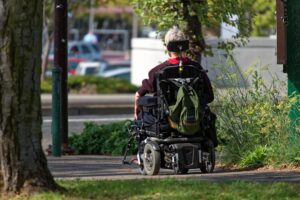The final rule still defines psychiatric service animals as service animals, but emotional support animals are no longer considered service animals. The rule allows airlines to limit individuals to 2 service animals, to limit them to animals that fit in the footspace on the plane, to require paperwork be completed regarding the animal’s health and behavior and includes other rules:
Category Archives: Web News
Social Security Musculosketal Listings Changing April 2021
The new rule are effective April 2, 2021. When the final rules become effective, SSA will apply them to new applications filed on or after the effective date of the rules, and to claims that are pending on or after the effective date.
Job Openings- Health and Human Services and PPS
The application deadline to apply for the Assistant Attorney General position in Health and Human Services has been extended to Dec. 8, 2020. The Health and Human Services Section advises the Oregon Health Authority (OHA), including the Public Health Division and Oregon State Hospital, the Oregon Department of Human Services, including Aging and People with Disabilities Division, Office of Developmental Disabilities Services Division, Self Sufficiency and Vocational Rehabilitation Divisions. The section also represents the Department of Consumer and Business Services, Division of Financial Regulation (DFR), the Home Care Commission, the Psychiatric Security Review Board and the Department of Education Early Learning Division’s Office of Child Care. Learn more about the position and apply here: Health and Human Services Position
PPS is hiring an Assistant General Counsel, with expertise in labor and employment. Read more about the position here: Assistant General Counsel. Apply at careers.pps.net and use job number # 21722. The deadline to apply is Dec. 11, 2020.
Addiction, Recovery and the Justice System: Free Learning Series
CareOregon, the Hazelden Betty Ford Foundation, and the Alano Club of Portland are hosting Addiction, Recovery and the Justice System, a free four-part educational series.
Session 1: Understanding Addiction | November 20, 2020. 12-1:30 p.m. PST
Join Judges Ann Lininger and Eric Bloch, District Attorney Paige Clarkson and defense attorney Shannon Wilson as they kick off this series with perspectives from the bench, prosecution and defense. Following, Dr. Steve Delisi from the Hazelden Betty Ford Foundation will examine the neurobiology and neuroscience of addiction and trauma. | Register Here
Session 2: Understanding Treatment | December 4, 2020. 12-1:30 p.m. PST
Mae Lee Browning, Legislative Director of the Oregon Criminal Defense Lawyers Association, begins this session with a personal message of recovery. Following, Heidi Wallace from the Hazelden Betty Ford Foundation will explore stages of change and how to recognize a person’s readiness to begin the recovery process. | Register Here
Session 3: Understanding Recovery | December 11, 2020. 12-1:30 p.m. PST
Jeremiah Rigsby from CareOregon opens this session, followed by Legislators Tawna Sanchez and Janeen Sollman who will discuss the work ahead in the 2021 legislative session. Karen Kern, Mercedes Elizalde, and Freda Ceaser from Central City Concern will discuss the continuum of care in Oregon for substance use disorders, the role of the justice system in a recovery-oriented system of care, and tools for incorporating equity and anti-racist values into actualizing justice and services delivery. | Register Here
Session 4: Understanding Hope | December 18, 2020. 12-1:30 p.m. PST
During this final session in the series, Brent Canode from the Alano Club of Portland and Monta Knudson from Bridges to Change will moderate a panel discussion with people who have lived experience with addiction and whose recovery journeys have intersected with the Oregon Justice System. Panel members include: Mae Lee Browning, Legislative Director of the Oregon Criminal Defense Lawyers Association; Janie Marsh Gullickson, Executive Director of the Mental Health and Addiction Association of Oregon; Hugo Gonzalez Venegas, Attorney and Oregon State Bar Diversity & Inclusion Coordinator; and Billy Anfield, Advocacy Coordinator at Central City Concern’s Flip the Script. They will share their experiences in recovery and perspectives on how our justice system can support recovery for justice-involved people with addiction. | Register Here
Visit hazelden.org/justiceseries for more information and all links in one place.
2021 Disability Law Section Executive Committee
We’re excited to announce our 2021 Executive Committee:
Officers
Chair: Tiffany Blackmon
Chair-Elect: Jan Atwill
Secretary: Terisa Page Gault
Treasurer: Jan Atwill
Members-at-Large
Bill Spiry
Rebecca Babarsky
Gordon Magella
New American Airlines Rule Prevents Some Individuals With Wheelchairs from Flying
American Airlines has instated new weight limits on wheelchairs on many of its flights. Some planes allow 300 lbs wheelchairs, while others allow 400 lbs wheelchairs. John Morris, who uses a 450 lbs power wheelchair, has been unable to fly some of his normal routes due to the new rule.
Read more on this topic:
https://wheelchairtravel.org/american-airlines-policy-prohibits-power-wheelchairs-regional-jets/
UPDATE: Policy has already been reversed. https://www.npr.org/2020/11/23/938063066/american-airlines-reverses-policy-that-imposed-weight-limit-on-wheelchairs?fbclid=IwAR3QHVZK2MukNX1GBwf_28ah2lOKH_s7GQSEtnN7q8AAlNm1U5JSgvq7nPc
There’s Still Time To Register for the Disability Law CLE!
Don’t forget to register for the two-day webcast CLE, Getting Oriented in the Civil Rights Statutes That Protect People with Disabilities: Where We Are, How We Got Here, and What’s New on the Horizon. The CLE will be held October 13th 11:00AM-1:05PM and October 14th 11:00AM-2:10PM.
Find more information here: Disability Law CLE
Register here: Register
Job Opportunity with PPS
Portland Public Schools is hiring a Senior Legal Counsel-Special Education. The first screening of applicants will take place October 23, 2020. Find more information on the position here: Senior Legal Counsel Job Description and apply here: https://www.pps.net/Page/2158 (Job Number #21619).
Intersection of Disability and COVID-19
Medical Care and Access to Support
Early in the pandemic, conversations began about hospitals trying to conserve scarce equipment such as ventilators and emergency beds by prioritizing who would receive the equipment. Reports were shared about policies that would deny potentially life-saving equipment to individuals with disabilities. Patients being treated for COVID who needed someone present to assist with their treatment (ie: a caregiver to help with decision-making, or someone to help with communication) were being denied access to those they relied on, because hospitals were not allowing any visitors to prevent the spread of COVID- and there were no exceptions for any visitors even as a disability accommodation. You can read about one of the patients impacted by these rules, Sarah McSweeney, here: https://www.opb.org/news/article/law-bars-disability-discrimination-covid-19/
SB1606 was signed in July (SB1606), and it requires hospitals to let a guardian/advocate be in the hospital with patients who need their assistance. It also requires notification to the state protection and advocacy organization if there is a plan to withhold or withdraw life-sustaining measures from a patient with an intellectual or developmental disability. It further makes it an unlawful practice to deny medical treatment or restrict/limit allocation of medical resources to protected class or based on patient’s race, color, national origin, sex, sexual orientation, gender identity, age or disability.
Masks and the Americans with Disabilities Act (ADA)
Masks have become a common topic of conversation in America. Accommodations are required for individuals with disabilities who cannot wear a mask because of their disability. However, the accommodation may not be what the individual is requesting; for example, they may not be allowed to enter a store without a mask, instead, the store may offer free delivery or curbside pickup. Nationwide, lawsuits over mandatory mask policies have been receiving media attention (oregonlive.com/mask-opponents-sue-to-invalidate-statewide-mask-requirement ; kxly.com/washington-mask-lawsuit ; natlawreview.com/article/pennsylvania-mask-lawsuit ).
Read more about the rights of individuals with disabilities on Disability Rights Oregon’s COVID-19 Know Your Rights page, which covers the right to medical care, access to supports while receiving care, mask-wearing and the ADA, and more: COVID-19 Know Your Rights
Social Security Updates
Telephone and video hearings
SSA has announced they will continue offering the option of telephone hearings, and video hearings will be offered via Microsoft Teams this fall. There has not yet been an announcement as to when in person hearings will again take place.
Read more here: https://www.ssa.gov/news/press/releases/2020/#9-2020-1; https://www.ssa.gov/coronavirus/
Video Consultative Examinations
POMS DI 22510.012 continues to allow psychological consultative examinations via video, only if the claimant agrees to the video CE, and if no testing is required.
Read more here: https://secure.ssa.gov/apps10/poms.nsf/lnx/0422510012
Delays in Preparation of Certified Administrative Record (CARs) Impacting Federal Appeals
COVID-19 has impacted SSA’s ability to compile and prepare Certified Administrative Records (CARs), which has resulted in delays in appeals before district courts. For example, the Central District of California ordered on April 17, 2020 that all Social Security case deadlines are stayed for: 1) actions brought against the Commissioner of Social Security pursuant to 42 U.S.C. § 405(g) filed on or after the April 17, 2020, and 2) those previously-filed actions in which the Commissioner has not prepared and served Plaintiff with the CAR. (Read the Order here: Order. ) Check with individual courts to determine how they are handling the delay in CARs.
Lawsuit Regarding SSA’s Wet Signature Requirements
In May 2020, the National Federation of the Blind filed suit against SSA for its “wet signature” requirement, 20cv1160 in the District of Columbia. In July 2020, the court denied Plaintiff’s motion for preliminary injunction. The case is still pending. Read/listen to an interview regarding the suit here: federalnewsnetwork.com/
SSA’s SSI Award Rate Lowest in 20 Years
David A. Weaver, Ph.D., economist and retired Federal employee, authored the linked article regarding SSI awards being the lowest rate they have been in 20 years: Weaver Article
Maxwell v. Saul, 9th Cir., 18-35992
In August, the 9th Cir. affirmed in part, and reversed in part, the district court’s decision affirming the denial of claimant’s application for disability insurance benefits and supplemental security income. The court considered whether two occupations was sufficient to satisfy the “significant range of work” requirement of the Medical-Vocational Guidelines of 20 C.F.R. pt. 404, subpt. P, app 2, Rules 202.00(c), 202.07. The court rejected the Commissioner of Social Security’s contention that claimant forfeited any challenge to the ALJ’s finding that she was not disabled by failing to raise the issue of significant range of work before the ALJ or Appeals Council.
Previously, in Lounsburry, the court held that for the ALJ to find the Plaintiff has transferrable skills to a “significant range of work,” more than 1 job must be identified. Now, the court held that two occupations also did not constitute a “significant range of work,” and were insufficient to satisfy Rule 202.00(c)’s requirement. The panel held further that because claimant’s skills were readily transferrable to only two occupations, the ALJ erred in concluding that she was not disabled. The panel reversed in part and remanded with instructions for calculation and payment of benefits for the period after claimant reached 55 years of age.
A bright-light rule for the number of jobs required to constitute a significant range was not established.







